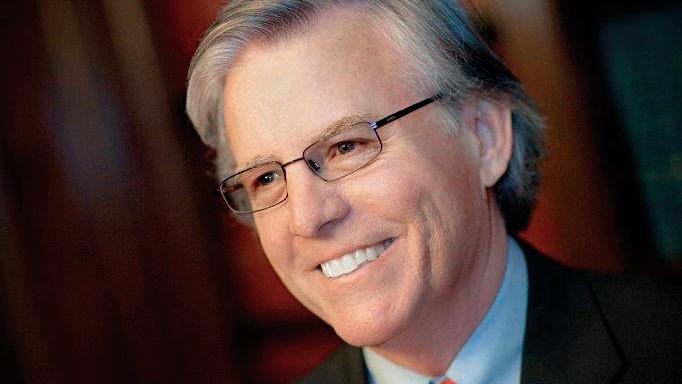Please click the link below to subscribe to a FREE PDF version of each print edition of the Niagara Reporter
http://eepurl.com/dnsYM9

By: Ken Hamilton
Nature, and even political nature, demands a balance; and it will create one, no matter how long it takes.
The densely-threaded sheets on the newly-inaugurated president and co-president’s White House beds had likely been changed but a few times before William Jefferson Clinton found himself beaming in a downstairs press conference about how quickly the economy had improved after his election. The reports were actually the last one of the 48 quarters of the terms of the Ronald Reagan/George H.W. Bush administrations. But you could neither blame Bill for accepting the credit for the economy of which his predecessors had only not just delivered to him, nor should we really forget how he also had just campaigned and won by criticizing his predecessors’ methods by which they created it. For you see, most politicians are like the “rain dancers” that climb the mountains outside of the village, observe the motion of the dark clouds, and then run back to the teepees of their political silos, grunt out a song while patting their mouths and dancing around in circles and announce that they will soon bring the much needed moisture for the crops to grow. Too many of our so-called leaders are exactly the same way. Don’t blame them – we could have gone to the top of the mountains ourselves and saw the same things, but we don’t even look to the hills until someone comes down from them that either looks or thinks as we do.
But this too shall pass. I have long said that based upon what each preceding administration has done, not done, or a combination of both is the elector of the following administration. As Clinton took credit for the work of Reagan and Bush the First, of course President Donald Trump will take credit for anything good that comes from President Barrack Obama’s administration. And regardless of who’s the next mayor of our city, a large part of his labor will be in hoeing and weeding what grew from the seeds of his predecessor.
And yet we voters still get so caught up in the echoes of political partisanship, not having read any of the various parties’ platforms before saying what they, and we, actually believe nor knowing what we actually are, nor do most of us understanding government enough to know if what the candidates say that they are going to do or undo is actually possible.
Our partisan arguments are fruitless for most of us. It all is similar to what former Secretary of State Hillary Clinton said about her non-response to the pleas for help from the embassy personnel at Benghazi, Libya, “What difference does it make?” I know this, for one, because just the other day I asked a middle-aged, working-class, African-American male if he was better off or not after 8-years of the Obama Administration. He shook his head and said no, and then stating that political parties make no difference to him either. He went on to state his reasoning by saying that, “I am too poor to be a Republican and get tax breaks, and too rich to be a Democrat and get benefits. Neither [party] makes a difference to me.” Well said.
Most of our lives are balanced upon the fulcrum of the combination of politically-connected rich one on end and politically connected poor on the other. Barrack Obama’s pandering and non-production to America’s black population is what opened the door for what Pulitzer Prize winner and the recently-deceased Toni Morrison called in her New Yorker Magazine, post-Trump election win essay titled Mourning for Whiteness that, “So scary are the consequences of a collapse of white privilege that many Americans have flocked to a political platform that supports and translates violence against the defenseless as strength.”
While I absolutely loved and respected Morrison, a balancing statement of her criticism of those who voted for Trump that could have been written by a Eurocentric essayist as reflective of Morrison’s opinion would have been, “So scary are the opportunities of an increase of superior black privilege that many black Americans have flocked to what they thought to be Obama’s political platform as one that supports and translates indifference against white Americans as strength.”
Evidence of the disenchantment that blacks had with Obama, and not just the one that was previously expressed by the middle-aged “not rich enough/not poor enough” black man, is that as political satisfaction waned not just for Obama, but also for the Democratic Party. Trump is destined to be a two-term president in the absence of black exuberance for the Democrats, even if either black Senators Cory Booker or Kamala Harris are the party’s standard bearers; hence why the party needs the invasion at our southern borders as either a last gasp to win or as a poison pill for Trump’s next term. Nature, and even political nature, demands a balance; and it will create one, no matter how long it takes.
But too often, it’s not what any one says that produces a change in the lives of others around them, or even themselves; it is what they say and do that make the differences — and so much of that is incredibly bipartisan. It all gives me pause to think about the impact that individuals can have upon people whom they will neither ever meet nor will the other person ever know. In my case it is with the Toni Morrison whom I met at the University of Buffalo back in the late 1990s.
Briefly, it was after she had given a wonderful reading of her newest works in the auditorium and then retired to a wine and cheese reception in the adjoining hall. Morrison, a rather large woman, has stood for more than an hour beneath a single spotlight in the warm and humid room as she read, and was afterwards so much so exhausted that during her reception she sat perspiring in a chair as people thanked her, shook her hand, but had their eyes on the mounds of delicacies that awaited them on the not faraway table. But I paused and looked into a moist and glowing face that seemed back-lighted by the internal brightness of brilliant mind. She looked back up at me as I held her hand and said, “You know something, Ms. Morrison?” She smiled and asked ‘What’.
“You don’t write …,” I said, and then gave a long pause as she began to exude contempt for me. But I continued before she could fully sum up her negative thoughts and say something, me saying, “You paint beautiful pictures in people’s minds by using soft, pastel, colored words.” Her contempt faded, a smile flashed upon her golden face that was more brilliant than the spotlight under which she had just beautifully read her calming works, and she then called me darling and thanked me for what I had said to her.
It was but a year or two thereafter that I was watching the Book Channel on C-SPAN when host Brian Lamb had attempted to interview a rather uninteresting author who answered Lamb’s long questions with but a few words. Just before I began to change the channel, Lamb said to the man that he had read that he had taken a writing course from Toni Morrison. The author perked up and exuberantly said yes. Lamb asked him what he had learned from Morrison, and the author said that Morrison taught the class not to worry so much about the mechanics of writing, but instead to focus on, get this, “… painting beautiful pictures in people’s minds by using soft, pastel, colored words.”
I can be quite harsh in some of the things that I write in my attempts to help others excel; I know this, but I often wonder about the faceless students that Morrison had taught after our brief encounter and about the pastel bouquet of the words that they write in them encouraging others to strive for their full potential and how I vicariously taught them as well. I think that it’s that way because nature, and even political nature, demands a balance; and it will create one, no matter how long it takes.






















